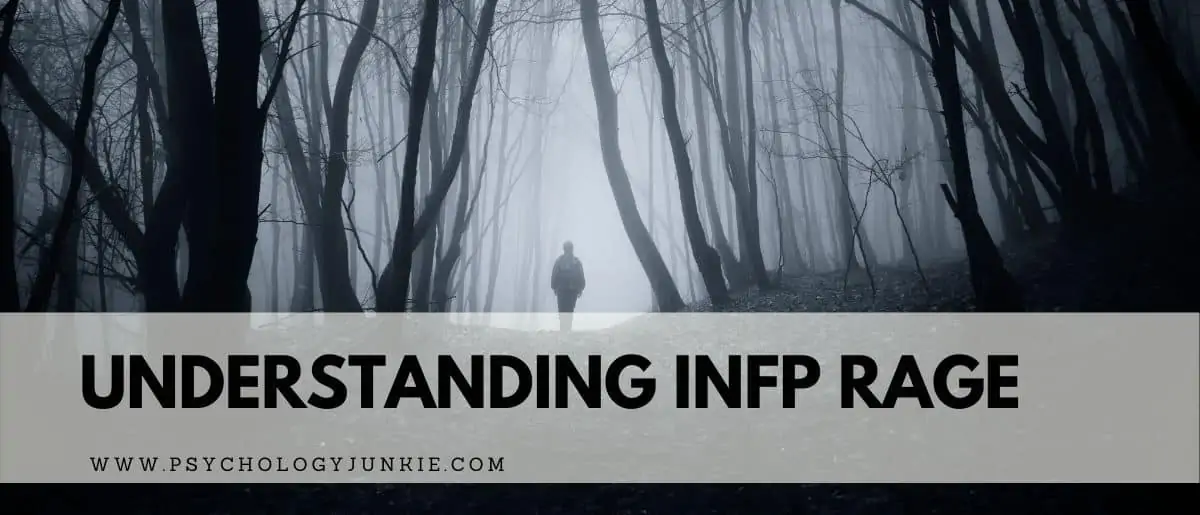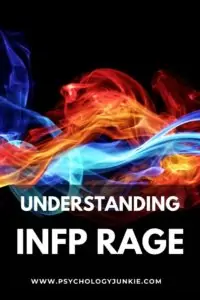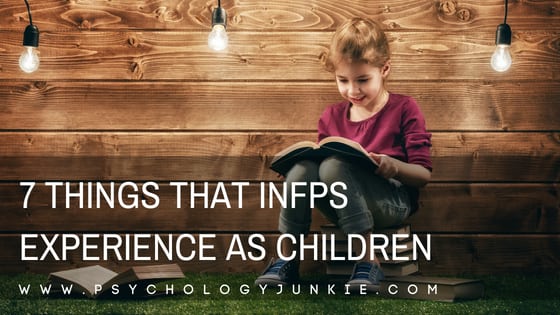Understanding INFP Rage
What happens when INFPs get angry? If you look at most descriptions of INFPs, you’ll see adjectives like “empathetic,” “harmonious,” and “accepting.” But what about the darker side of the INFP? What happens when they have had more than they can take? That’s what we’ll be exploring today!
Not sure what your personality type is? Take our new personality questionnaire here. Or you can take the official MBTI® here.

Table of contents
- Different Types of INFP Anger
- What Makes INFPs Angry?
- Here are some of the things that make INFPs the angriest:
- Stress Anger
- INFP Grip Stress
- What Do INFPs Do When They’re Angry?
- The Introverted Feeling Response to Anger
- What INFPs Need When They’re Angry:
- What Are Your Thoughts?
- Other Articles You Might Enjoy:
Estimated reading time: 11 minutes
Different Types of INFP Anger
Anger can arise for a variety of different reasons. Sometimes anger erupts because of ongoing or chronic stress. At other times, anger is the result of betrayal, a disagreement in values, or an insult. Because there are multiple forms of anger we can’t address them all in the exact same way. Slow-burn, stressed anger will cause a different reaction from a sudden betrayal of their relationships, feelings, or ethics.
What Makes INFPs Angry?
Back in 2016, I wrote an article called 5 Ways to Annoy an INFP. In my research, I surveyed hundreds of INFPs about the things that really ticked them off.
Here are some of the things that make INFPs the angriest:
- Arrogance
- Phoniness or dishonesty
- Insensitivity
- Narrow-mindedness
- Being put on the spot
- Poor listening skills
- Deadlines
- Overly-scheduled, regimented time
- Having their ideas dismissed or belittled
- Corruption in the world
For the most part, INFPs enter situations and communications with an open mind. When they’re in a healthy psychological state they are curious, patient, and accepting.. Unless someone betrays one of their very core values in an overt way they’re unlikely to get judgmental or irritable with people. Dario Nardi, a neuroscience expert, says “They (INFPs) are the consummate listeners. They thoroughly engage all brain regions that process voice, words, and sounds; moreover, they may easily enter a unique whole-brain state when listening to other people, whoever those people might be.”
Because INFPs approach the world with curiosity, openness, and empathy, people who irritate or anger them are likely to be the opposite way. Those who form quick judgments based on their own experiences are likely to rile up an INFP, especially if those judgments are directed towards those whom the INFP loves or cares about. INFPs are deeply loyal to their values, beliefs, and causes, so someone who makes an uninformed or rapid judgment about such things may be at the receiving end of a death glare or stony silence.
In the same way, people who are pushy, critical, or overbearing will irritate INFPs. Because they are usually slow to criticize, people who are quick to critique can seem mean-spirited and hasty to them.
“Listen. Slow down. Put yourself in someone else’s shoes. Without doing that your judgments are meaningless.” – Andrea Ebert, an INFP
We can get an understanding of the things that might anger INFPs just by looking at their four-letter preferences:
I – Introversion
INFPs need time alone to recharge and refuel. Their inner world is rich and comforting to them. Because of this, over-scheduled time, interruptions, or lots of socializing can make them feel grumpy and drained.
N – iNtuition
INFPs trust the world beyond the sensory. The imagination as well as the abstract world of concepts and ideas is what excites them. When their ideas, imaginations, and theories are rejected, belittled or ignored they will feel slighted and irritable. In the same way, if they have to focus on a lot of concrete details and facts that don’t stimulate their imagination, they can become bored and listless.
F – Feeling
INFPs approach situations and decisions by putting themselves in other peoples’ shoes. They want to know what it would be like to be in a situation before they make a judgment. They also value tact, empathy, and conscientious behavior. People who are critical, harsh, or impersonal can rub them the wrong way if they aren’t careful.
P – Perceiving
INFPs approach the world with an adaptable, open-minded perspective. They like to keep their options open and have plenty of unstructured time to be creative and follow their inspirations. Being pressured to make a decision or having all their time managed for them can make them stressed, angry, and creatively drained.
Stress Anger
Chronic or intense stress can also trigger the INFP’s rage. Prolonged exhaustion, pressure, illness, or conflict can make them exhaust their normal resources and get stuck in their inferior function. Typologists call this “grip stress.” If you’re new to learning about type, I’ll give you a quick rundown of what this means:
INFPs have the following mental function stack:
Dominant function: Introverted Feeling (Fi)
Auxiliary function: Extraverted Intuition (Ne)
Tertiary function: Introverted Sensation (Si)
Inferior function: Extraverted Thinking (Te)
When INFPs are operating from a healthy place, all their mental functions are working in tandem to support and help each other (with the ultimate support being given to the dominant function). The bulk of the mental energy is given to the dominant and auxiliary functions; Introverted Feeling (Fi) and Extraverted Intuition (Ne). These functions align with the NF letters in the INFP code.
When INFPs are severely or chronically stressed, they tend to immediately look to their NF side to solve whatever is stressing them out. If these functions fail them or if they’re overly-relied upon, then the INFP can fall into the grip of the inferior function: Extraverted Thinking (Te).
INFP Grip Stress
When INFPs experience grip stress, they become less concerned with harmony and tact. They stop caring about others’ feelings as much and react quickly without worrying about careful evaluation. Often this takes on the form of mulling over bitter thoughts towards others or becoming sarcastic and passive-aggressive. They will feel a restless urge to organize everything around them and “fix” errors that seem like raging fires in desperate need of extinguishing.
“No matter the relationship, I tend to internalize and repress my anger. I prefer to shut myself off and walk away to have some space to exhaust my anger in silence at first. I won’t have the energy to be the polite, nice version of myself anymore and I can have such a sharp tongue if I don’t get that space. It’s all stubborn, unwavering cold from my side. It’s a very rare thing for me to be that angry though.” – @somniferumia, INFP Twitter User
Symptoms of an INFP experiencing grip stress include:
- Feeling disconnected from their values and deeper feelings
- Hyper-fixating on accomplishing tasks
- Judging others as incompetent
- Becoming more critical and passive-aggressive
- Becoming hypersensitive about others’ mistakes
- Becoming nitpicky about logic
- Feeling mentally stifled or stuck, like there are no possibilities
- Becoming more short-tempered and blaming
- Feeling an enormous need to take action and “fix” things
What Do INFPs Do When They’re Angry?
A lot of things can influence how an INFP will express their anger, but typically they tend to withdraw. Retreating from the world in order to process their feelings is an essential part of the healing process for INFPs. They don’t want to be pressured to talk about their feelings right away because they worry they’ll say something they regret later or they struggle to put words to their convoluted thoughts.
“I have a bad habit of internalizing my emotions. When I’m angry I get more quiet, if I’m really mad I won’t try to socialize even for the sake of being a nice and decent human being to others around me. But I’m afraid that’s how all my negative emotions roll – I just shut -everyone out, mostly because I don’t trust myself to not hurt people. If I’m mad I can say hurtful things and I hate doing that. Also, if I’m very mad, I sometimes cry and I hate this too.” – @icanonlybreathe, INFP Twitter User
“I can be reclusive or I can be uncharacteristically snappy. I often will want space to sort through how I feel. If pushed to express, I usually get emotional and reactive. Sometimes, I will want nothing to do with the situation. Other times, I just want to talk it through calmly. Sometimes I stomp angry clean or stomp around sighing and avoiding eye contact. But this depends on the level of anger and how comfortable I am with the person.” – @_F_i_N_e
The Introverted Feeling Response to Anger
Introverted Feeling (Fi), as the INFP’s dominant function, is focused primarily on assessing one’s own inner values, ethics, and motivations. As such, INFPs are introspective, reflective, and determined to live according to their set of independently defined values. “What matters to me?” “What will matter at the end of my life?” “Am I being authentic?” “What is my heart telling me?” These are all questions that play on the INFP mind on a regular basis. When INFPs are angered, they aren’t usually quick to react. They initially attempt to filter their feelings through their Introverted Feeling judgment center. Introverted Feeling is often misunderstood by people who are new to type. They assume that because the word “Feeling” is used, that Fi revolves around emotions. While Fi types listen to their emotions and analyze them, they aren’t focused on simply acting on their emotional impulses. Any type can do that. Fi focuses on looking deeper.
What are these emotions telling me? What’s the inner truth buried beneath the feelings? What significant part of my values or ethics is being alerted to a potential problem?
Introverted Feeling is about looking beneath the emotions to assess the significant motivations, truths, and ethics that are playing out beneath the surface. So when INFPs are angry, they will typically retreat in order to look beneath the anger. Often a great deal of analysis goes on during these quiet moments. Aftewards, if they decide it will do any good, they may choose to discuss their feelings or the offense at hand, or they may decide the relationship or person that triggered them isn’t worth reconciling with and shut them out.
“I get very quiet, and focus hard on my thoughts and feelings, running through them rapidly and repetitively. Physically, I get rigid and a bit fidgety, and often sigh with exasperation. On very rare occasions, I will actually blow up, and my language gets very colourful! Mind you, I try to catch myself and determine whether the situation really warrants my anger. If not, I’ll think of something funny to take the edge off, or try to get some perspective, giving others the benefit of the doubt, for example. Something I continue to work on, if I’m angry with a person, is communicating it to them directly and carefully. In the past, I usually would never say anything at all. Meditation and non-violent communication techniques have been so helpful in this regard! I also enjoy finding a funny take on whatever made me angry. I do amateur standup, and the various random things that make me angry are wonderful sources for material. Comedians are often deeply and beautifully angry people!” – @MarathonMatson, an INFP Twitter User
What INFPs Need When They’re Angry:
Time and space are initially what most INFPs need when they’re angry. They need a chance to understand their emotions and thoughts in order to figure out where they really stand. If you’re reading this and you’re an INFP, try to give the person you’re upset with a heads up that you need some time to analyze things because you’re upset. This way, if the relationship is worth fighting for, the individual isn’t left in the dark wondering why they’re getting the silent treatment.
Patience, honesty, and consideration are all important things that INFPs need when they’re angry. If you’re the offender, own up to your mistakes and don’t try to make excuses. If you’re not sure why the INFP is angry, ask them if they are willing to talk about what’s bothering them. When they explain their position to you take time to really listen and imagine it from their perspective. Remain calm and respectful, focusing on getting to the root of the problem rather than casting blame or having the upper hand. Being direct is important, but being direct while also being considerate and tactful is essential. The silent treatment or passive-aggressive behavior can make problems escalate, especially in romantic relationships. Psychology Today has an excellent article on 10 tips to solving relationship conflicts that is extremely helpful in this regard.
The important thing is to respect the INFP’s boundaries, be gentle when listening, and own up to any offenses that may be your fault. It’s also important that you realize that they will need time to process their feelings before directly confronting the problem in most cases. Being pushy or overbearing about talking it out before they’ve had a chance to think can cause them say things they later regret. Gentleness, empathy, and space are crucial in order for INFPs to be able to reconcile their anger and figure out what their next move is.
What Are Your Thoughts?
Do you have any insights on how to handle anger as an INFP? Share your experiences and thoughts in the comments!
Find out more about your personality type in our eBooks, Discovering You: Unlocking the Power of Personality Type, The INFJ – Understanding the Mystic, and The INFP – Understanding the Dreamer. You can also connect with me via Facebook, Instagram, or Twitter!
Other Articles You Might Enjoy:
What Each Myers-Briggs® Type Loves About INFPs
For the INFJs and INFPs Who Are Drowning in Worry
12 Fictional Characters You’ll Relate to if You’re an INFP










I’m an INFP and used to get angry and withdraw a lot. I didn’t want to be around people because I didn’t want to have to try be nice. The way I deal with this anger is I come to the Lord and ask him to help me with my anger. Since I have grown in my faith I have become a much happier person and do not get close to as angry any more. In the past three years I think, I have only had a slam-my-room-door, anger fest a couple of times and it doesn’t last as long.
I would think Enneagram Tyoe would have a signifigant effect on INFP anger and how it is expressed. My Mom was an INFP E4 sx/sp and was almost always in a constant state of expressive anger. E4 sx/sp being the craziest of the crazy by default.
I had a fit of rage yesterday. Hence why I looked up this article. I got mad at something going on, and I got on Facebook and pretty much told the whole world to go F*** themselves. Let’s just say I used a lot of colorful language, repeatedly. It wasn’t directed at anyone in particular. Then I felt super bad afterwards and apologized. I rarely blow up like that now as an adult. I think a big contributing factor was that we just got back from a stressful vacation. I had been under a lot of stress for weeks. At least my friends are understanding.
I feel as though another thing that is really stressful, is that when I have a strong connection to something or some place, or someone, and then you are ripped away from it all, you feel as though you’re being blindfolded and shoved into a dark alleyway being forced to fend for yourself. i was moved from my home, my fabulous school, and my best friends, to start middle school at a terrible school full of lying teachers. when i get home, i something as simple as a song i remember, will send me bursting into tears, and it doesn’t stop until i go to bed. the only way i feel like i can get back to a happy state is by going back, if only it were possible.
Assertiveness is something that doesn’t come naturally for me as a INFP-T. I have always thought how is it some people don’t know I’m stewing in anger when my face has ‘changed’.
I realise the need to practise speaking up about my needs long before I get to the colourful language or silent treatment part of my ‘anger regime’ as people tend to get shocked and flustered.
When I get angry, I can make throat slit comments. It’s the best way I can describe them. All it takes is a nasty experience to harshly misjudge someone you never met for instance.
Had bad experience with a neurologist, one who was more arrogant and a seizure trigger. A friend was with me. She said there’s someone else I want you to book an appointment with. I said OK we did that. We go out to her car. She mentioned what the other one has done for her husband. I said yeah well neither one of you is also blind, whatever he’s probably another narcissistic piece of. **** excuse for a neurologist. That was furthest from the truth. Some people you can just tell. Without fully saying the comment, I felt so terrible. It took seven years to finally bring it up. It was bothering me. So yes, regretting things later that you said which were unfair.
the other difficulty is dealing with overbearing intrusive, loud obnoxious people who don’t leave you alone when you walk away. Instead, they follow you like a Chihuahua barking orders. Example my mother-in-law. My neurologist does not like her either. I didn’t even have to say it I was already thinking it. He’s the one who said it. She needs to be very small doses because I know she’s a seizure trigger for you. Bingo great minds think alike. I say more? Those people are so difficult to deal with. It’s hard to not snap at them. What I try to do now is walk away that’s all I can do.